Have you ever heard the saying, ‘you are what you eat’? Well, the same goes for your feathered friend. Your bird’s diet is one of the most crucial factors in maintaining their overall health and well-being.
A healthy diet can lead to a longer life, a beautiful coat of feathers, and a happier bird in general.
Think of your bird’s diet like the fuel for a car. Just like how a car requires the right type of fuel to run efficiently, your bird needs the right type of food to thrive.
It’s not just about feeding your bird any food that’s available; it’s about providing them with the right nutrients that will help them live their best life.
So, let’s take a closer look at the top foods that your bird needs to thrive.
Key Takeaways
– A bird’s diet should include a variety of fresh fruits, vegetables, grains, legumes, and seeds.
– Premium brands prioritize organic and non-GMO ingredients, and trusted brands are transparent about their sourcing practices.
– Avocado, chocolate, caffeine, high-fat and high-sugar foods, garlic, and onions are toxic to birds and should be avoided.
– Consulting with a veterinarian or bird nutritionist can ensure appropriate portion sizes and a well-rounded diet.
Colorful Fruits and Vegetables
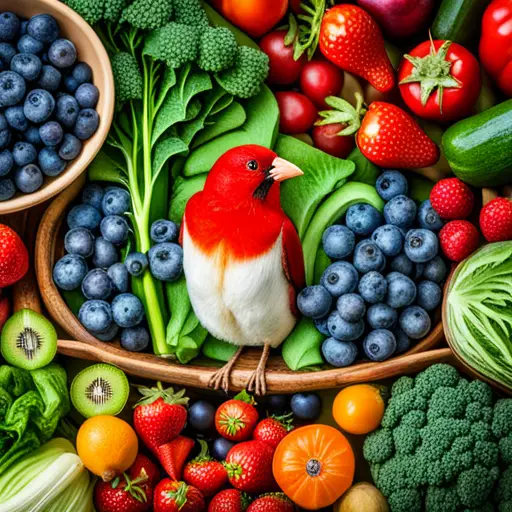
You’ll want to feed your bird colorful fruits and veggies to keep them healthy and happy!
Juicy berries like strawberries and blueberries are a great source of antioxidants, which can help protect your bird’s body from damage caused by free radicals. Not only that, but they’re also packed with vitamin C, which is essential for maintaining a strong immune system.
Leafy greens like kale and spinach are also important, as they’re rich in iron and other essential vitamins and minerals.
By adding variety to your bird’s diet with these colorful fruits and veggies, you can help ensure that they’re getting all the nutrients they need to thrive.
Creative ways to incorporate colorful produce into your bird’s diet include adding berries to their morning bowl of birdseed, or mixing leafy greens into their favorite birdie bread recipe. You can also try serving up diced fruits and veggies as a tasty and nutritious treat.
Just be sure to wash all produce thoroughly and remove any seeds or pits before feeding to your bird. And remember, while colorful fruits and veggies are important, they should always be just one part of a balanced diet that includes high-protein seeds and nuts.
High-Protein Seeds and Nuts
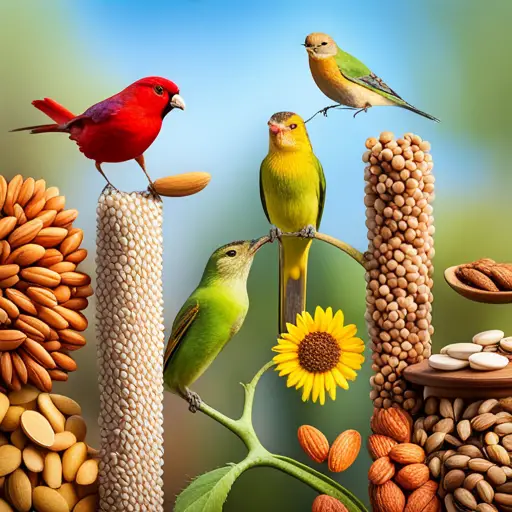
If you want to keep your bird healthy and happy, you should offer them foods that are high in healthy fats and protein. This means including a variety of nutritious seeds and nuts in their diet.
However, it’s important to remember that moderation and portion control are key to ensuring that your bird is getting the right amount of nutrients without overindulging.
Offer Healthy Fats and Protein
Adding healthy fats and protein to your bird’s diet can greatly improve their overall health and well-being. There are many healthy fat sources and protein-rich options that you can incorporate into your bird’s diet. These foods will not only provide essential nutrients, but they will also help keep your bird feeling full and satisfied.
To help you get started, here is a table of some of the top healthy fat sources and protein-rich options for your bird:
| Healthy Fat Sources | Protein-Rich Options | Serving Size |
|---|---|---|
| :———————: | :———————–: | :———————–: |
| Avocado | Boiled Egg | 1/2 slice |
| Flaxseed | Cooked Chicken | 1-2 small pieces |
| Sunflower Seeds | Cooked Turkey | 1-2 small pieces |
| Hemp Seeds | Cooked Fish | 1-2 small pieces |
| Coconut Oil | Tofu | 1-2 small pieces |
By incorporating these healthy fats and protein-rich options into your bird’s diet, you can help ensure that they are getting all the nutrients they need to thrive. But don’t stop here – keep reading to learn about some examples of nutritious seeds and nuts to add to your bird’s diet.
Examples of Nutritious Seeds and Nuts
Incorporating nutritious seeds and nuts into your bird’s diet is a great way to provide them with essential nutrients and improve their overall health and well-being. However, seed selection is crucial in ensuring that your bird is getting the right nutritional benefits. Different types of seeds have varying levels of essential vitamins and minerals, so it’s important to offer a variety in your bird’s diet.
Adding nuts to your bird’s diet is also a great way to provide them with healthy fats and protein. Nuts like almonds, walnuts, and pecans are all excellent sources of nutrition. But remember, moderation and variety in diet are key. Overfeeding your bird nuts can lead to obesity and other health problems. It’s also important to rotate the types of seeds and nuts your bird is consuming to ensure they are receiving a well-rounded diet.
As important as it is to offer your bird nutritious seeds and nuts, it’s crucial to keep in mind moderation and portion control. Overfeeding your bird can lead to health problems, so it’s important to monitor how much they are eating and adjust accordingly.
In the next section, we’ll discuss the importance of moderation and portion control in your bird’s diet.
Moderation and Portion Control
Remember to be mindful of how much you’re feeding your feathered friend and keep portion sizes in check to ensure their overall health and well-being.
Although seeds and nuts are nutritious, they can also be high in fat and calories. Therefore, it’s important to feed them in moderation to avoid obesity and other related health problems. Benefits of moderation include maintaining a healthy weight, reducing the risk of health problems, and keeping your bird’s digestive system functioning properly.
Additionally, portion control helps you avoid waste and save money in the long run. It’s recommended to consult with your veterinarian or a bird nutritionist to determine the appropriate portion size for your bird’s specific breed and activity level.
Remember, a healthy bird is a happy bird.
When it comes to feeding your bird, pellets are an essential component to ensure a balanced diet.
Pellets
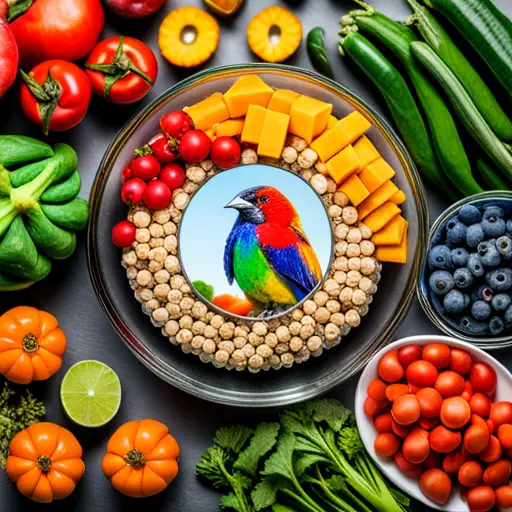
If you want to ensure that your bird is getting complete and balanced nutrition, pellets are a great option. When choosing a brand, make sure to go for high-quality ones that are specifically formulated for your bird’s species.
It’s important to introduce pellets gradually, mixing them with your bird’s current food to help them adjust to the new diet.
Provide Complete and Balanced Nutrition
Ensuring your bird receives complete and balanced nutrition is crucial for their overall health and wellbeing. While pellets are a great foundation for their diet, it’s important to provide variety to prevent nutrient deficiencies. Birds need a variety of fresh fruits, vegetables, and protein sources to maintain optimal health.
To give you an idea of what a balanced bird diet looks like, here’s a table outlining the suggested daily intake for a small parrot:
| Food type | Amount |
|---|---|
| ———— | ——— |
| Pellets | 1/4 to 1/2 cup |
| Fresh fruits and vegetables | 1/2 to 1 cup |
| Protein source (e.g. cooked chicken, scrambled eggs) | 1-2 tablespoons |
By including a variety of foods, you can ensure your feathered friend is receiving all the necessary vitamins and minerals for a strong immune system, healthy feathers, and a happy disposition. When it comes to choosing high-quality brands, opt for ones that use organic and non-GMO ingredients to avoid harmful chemicals and additives. By providing a variety of fresh foods and choosing high-quality brands, you can help your bird thrive.
Choose High-Quality Brands
By selecting premium brands that prioritize organic and non-GMO ingredients, you can guarantee your feathered companion is receiving a wholesome and nutritious diet that will keep them in optimal health.
When it comes to identifying high-quality brands, there are a few things to keep in mind. Look for brands that are transparent about their ingredients and sourcing practices. A trusted brand will clearly state what ingredients are in their food and where those ingredients come from.
Additionally, check to see if the brand has been certified by reputable organizations, such as the USDA or AAFCO. These certifications ensure that the brand meets specific quality standards and regulations.
Understanding the importance of brand selection is crucial for your bird’s overall health and wellbeing. By providing them with high-quality, nutrient-dense food, you’re giving them the best chance at a long and happy life.
Once you’ve identified a brand that meets your standards, it’s important to gradually introduce it to your bird’s diet to avoid any digestive upsets. With patience and care, you can help your feathered friend thrive on a diet that supports their unique needs.
Gradual Introduction
To avoid any digestive upsets, it’s important to gradually introduce your feathered companion to their new, high-quality diet. Here are some tips for a successful transition:
– Start by mixing a small amount of the new food with their current food and gradually increase the amount over a few weeks.
– Monitor their droppings to ensure they’re adjusting well to the new food.
– Introduce new foods one at a time to ensure they’re not allergic or intolerant to any particular ingredient.
In addition to easing the transition, gradually introducing new foods also has the benefit of providing variety in your bird’s diet. Variety is important for optimal health and can prevent boredom and picky eating habits.
With these tips, your bird will be well on their way to a healthy and diverse diet. Moving forward, let’s talk about the benefits of incorporating whole grains into their meals.
Whole Grains
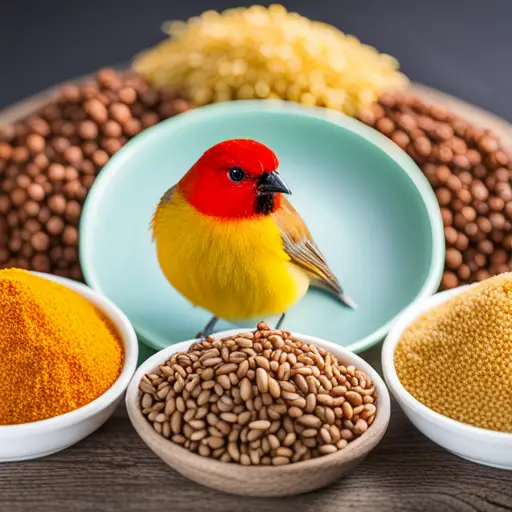
Indulge your feathered friend with the hearty goodness of whole grains, symbolizing nourishment and comfort for a happy and healthy bird. Whole grains such as oats, barley, and quinoa are packed with nutrients that can boost your bird’s immune system and improve digestion.
When cooked, these grains provide a soft and chewy texture that your bird will surely enjoy. Aside from the benefits of whole grains, cooking with them is also easy and convenient. You can simply cook a batch of grains ahead of time and store them in the fridge for future use.
You can also mix them with other bird-friendly ingredients like fruits and vegetables for a more varied and nutritious meal. Just remember to avoid seasoning and adding any harmful ingredients such as salt, sugar, and spices.
Incorporating whole grains into your bird’s diet is a simple and effective way to promote their overall health and well-being. However, it’s important to remember that not all foods are safe for your feathered friend.
In the next section, we’ll discuss some harmful foods that you should avoid feeding your bird.
Avoid Harmful Foods
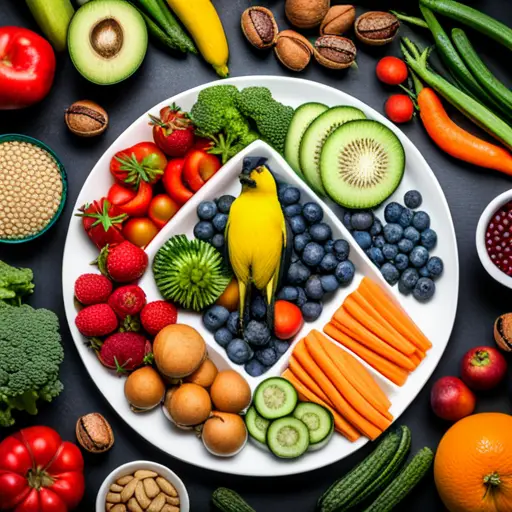
You know that feeding your bird a wholesome diet is essential for its health and well-being. However, it’s equally important to avoid feeding them harmful foods that can adversely affect their health.
In this subtopic, you’ll learn about the examples of foods you should avoid, the risks and health concerns associated with them, and safe and healthy alternatives that you can feed your bird instead.
Examples of Foods to Avoid
Unfortunately, some of the foods we enjoy can be harmful to our feathered friends. For example, avocado contains persin, which is toxic to birds and can cause respiratory distress. Similarly, chocolate and caffeine can lead to hyperactivity, seizures, and even death. It’s important to keep these common toxins away from your bird and choose alternative options to ensure their health and safety.
Eating the wrong foods can have serious effects on bird health. For instance, consuming high-fat and high-sugar foods can lead to obesity, liver disease, and heart problems. Additionally, some foods, such as garlic and onions, can cause red blood cell damage and anemia in birds.
As a responsible bird owner, it’s crucial to educate yourself on the risks and health concerns associated with feeding your pet. By making informed decisions, you can keep your feathered friend happy and healthy.
Risks and Health Concerns
Be mindful of the potential health risks that certain foods can pose to your feathered companion, as consuming the wrong foods can lead to serious health issues such as obesity, liver disease, and heart problems. In order to prevent obesity, it’s important to avoid giving your bird foods that are high in fat and calories. This includes foods like cheese, nuts, and seeds, as well as human junk food like chips and cookies.
Another important consideration is the presence of toxic substances in certain foods. Some common household foods like chocolate, avocado, and garlic can be toxic to birds and should be avoided at all costs. To help you better understand which foods can be harmful for your bird, here is a table outlining some common problem foods and their associated health risks:
| Problem Foods | Health Risks |
|---|---|
| Chocolate | Can cause heart problems and seizures |
| Avocado | Contains persin, a toxin that can cause heart and respiratory problems |
| Garlic | Can cause anemia and digestive issues |
| Onions | Can cause anemia and digestive issues |
It’s important to be aware of the risks associated with certain foods so that you can make informed decisions and keep your bird safe and healthy. Now, let’s explore some safe and healthy alternatives to these problem foods.
Safe and Healthy Alternatives
If you want to keep your feathered friend healthy and happy, there are plenty of delicious and safe alternatives to those problem foods. The key is to offer a variety of fresh foods that are rich in nutrients and low in fat.
Birds need a balanced diet that includes a mix of fruits, vegetables, grains, legumes, and seeds. By offering a range of healthy options, you can help your bird maintain a strong immune system, healthy feathers, and a happy disposition.
One of the benefits of variety is that it helps to prevent boredom and encourages natural foraging behaviors. Try offering your bird a mix of chopped fruits and vegetables, such as carrots, broccoli, apples, and oranges. You can also offer cooked grains, such as brown rice and quinoa, as well as legumes like lentils and chickpeas. Fresh herbs like parsley and cilantro can also be a tasty addition to your bird’s diet.
Just be sure to change out the food frequently to ensure freshness and avoid spoilage. By providing your bird with a healthy diet, you can help them thrive for years to come.
Conclusion
So there you have it, bird lover! You now know the top foods that your feathered friend needs to thrive.
Make sure to include a variety of colorful fruits and vegetables in their diet, as well as high-protein seeds and nuts. Pellets and whole grains can also provide important nutrients for your bird.
Remember to avoid harmful foods such as avocado, chocolate, and caffeine.
By providing your bird with a balanced and nutritious diet, you’ll help them live a long and healthy life. So go ahead and treat your avian companion to some tasty and healthy snacks today!
